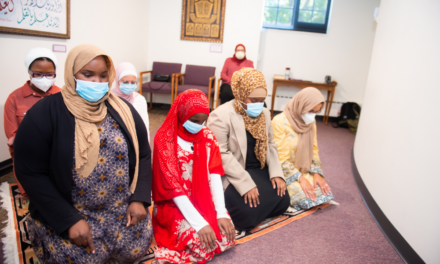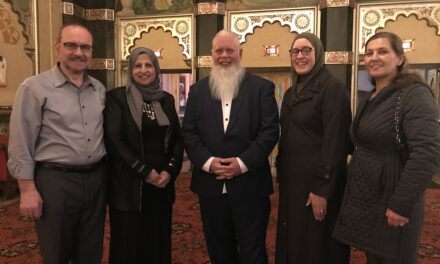Dating is the norm in America and that is a challenge for Muslim youth, Br. Ameer Hamza recently told an overflow crowd of mostly teenagers at the Islamic Center of Milwaukee.
More than 100 youth attended Hamza’s Friday evening program “Falling in Love & Dating: Navigating Gender Relations in Islam,” Jan. 24, at the ISM, 4704 S. 13th St. Milwaukee. Hamza is an imam whose role is to work with teenagers, college students, millennials, and young professionals. Hamza spoke about the reasons for avoiding America’s casual dating scene and answered questions his audience sent by text anonymously.
The lessons of Islam
Muslim youth should not “date,” spending one-to-one time together alone to get to know each other as a step toward marriage, said Hamza. “(The Muslim youth) ask me, ‘What’s the big deal?’
“Our religion says when it comes to a physical relationship between a guy and a girl, it is not allowed except in the framework of marriage,” Hamza said. “And not only Islam; Judaism and Christianity also teach this.
“We all know the rules. A lack of knowledge is not the issue,” he said. The problem is found in the gray areas, like “what if we just hang out?” Hamza recommends “disengaging from the gray areas.”
The first thing to understand, Hamza said, is that “when God makes something halal or haram, it is for your benefit. The only things God makes haram are inherently harmful. Memorize this equation: haram = harmful,” he told the youth.
“God is genuinely looking out for your interests; Allah wants to lighten your burden,” Hamza said. “What burden? The burden of broken hearts, the burden of toxic relationships, the burden of unrealistic expectations, the burden of unrealistic beauty standards.”
Islam teaches that Muslims should not “come near fornication,” said Hamza. “Why does he say, ‘Don’t come near’? Because it is a process. It starts with swiping right. Then there is the first meal, the first movie, the first kiss. It is a process. Don’t get on the ladder.
“Sisters tell me, ‘I’m not in it for that stuff. If we are going to be private together, we know our limits. Why can’t we be in a private setting?”
The answer, according to Hamza, lies in the different “psychology between guys and girls. Girls are craving relationship, a feeling of being loved, of being cherished. For girls, relationship comes first; sexuality comes later.
“As for the guys, and don’t you even dare pretend,” he said, pointing to the side of the hall filled with boys and young men, “you know that for you, relationship comes later; desires come first.
“Girls make the mistake of thinking if she gives the guy what he wants, he will give her what she wants. That actually never happens.”
Hamza compared the rules of Islam to seatbelts on a rollercoaster. “The guy behind you doesn’t buckle his seatbelt. He says, ‘Lighten up. Why do you have to be so strict?’ But who is in real danger here?”
Casual sex and its consequences
The real issue, said Hamza, is “the harm God is protecting us from. The toxic nature of casual sex and dating culture is out of control. When you disregard God’s rules, it has severe side effects.”
Consequences include children born out of wedlock, in some cases not knowing their fathers, high divorce rates and many single-parent households.
In addition, suicide rates, stress, anxiety and mental illness among teens are at all-time highs, Hamza said. One contributing factor is heartbreak of broken relationships, he said. “Heartbreaks are inevitably going to occur.”
For more about the current situation of today’s youth, Hamza recommends two books: Boys Adrift and Girls on Edge, both by psychologist and family medicine provider Leonard Sax, Ph.D., M.D.
How did we get into this mess?
Dating in America starts at age 13, and by 15, many teenagers have had their first sexual experience, Hamza explained. “And what is the average age of marriage – 28 or 29. Having been sexually active for so long, with all that sexual variety, how are you going to settle for one person?
“Marriage is hard work. If you are used to a life with no commitments and all the benefits, how are you going to commit in a marriage? You have to build a stamina of commitment.”
Questions from the youth
How can you avoid dating and smoking weed if you go to a school where that is the norm?
“Don’t pretend to be super human. You are going to be like your friends, so find a good group of friends. Find a role model, a mentor. And put yourself in a grid of knowledge – attend classes, lectures, about issues.”
Does halal dating exist?
“Yeah, but it may be a little awkward. It is called ‘chaperone dating.’ When I was in Milwaukee and my wife-to-be was in Houston, I traveled there to meet her. We’d go into the dining area. The family was all in the living room, in the vicinity.”
When you are ready to get married, you can get your family involved and meet potential spouses, he added.
Any activities with the other gender should be “PPL, professional/purposeful, public and limited,” like working on a school-related project with a mixed group, he added.
How can I get out of a haram relationship or a same gender relationship?
Start thinking of an exit strategy. Slowly distance yourself, take forever to respond to messages, slowly de-escalate. Get professional help. Join a support group. Up your spiritual game. Find an emotional anchor.
A word to parents
“When your teen comes to you, don’t overreact to the relationship conversation. Build a relationship where they can talk to you and you can guide them.”














